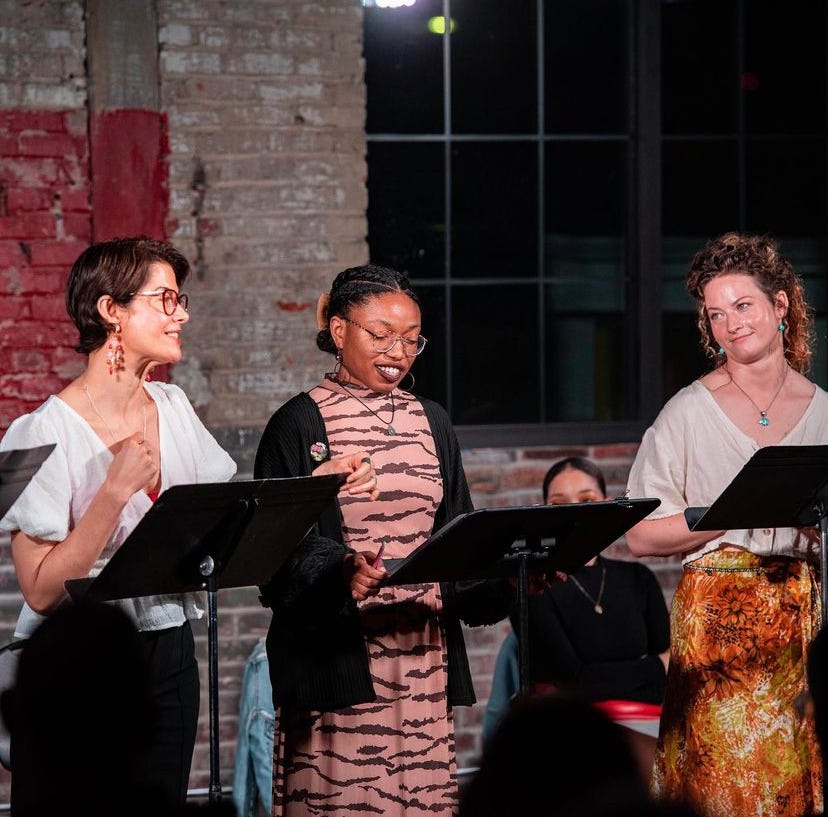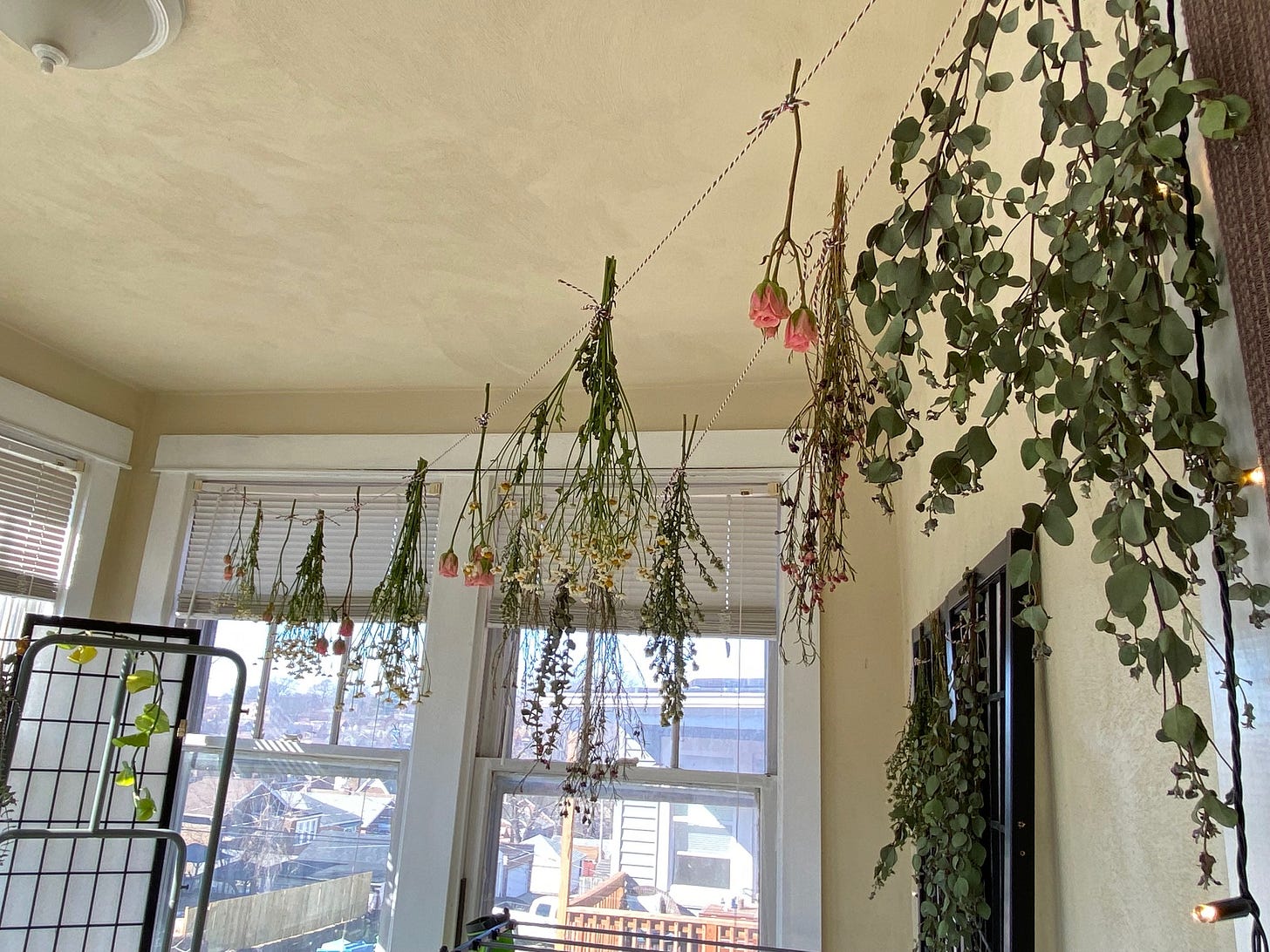Letters from the Homestead: March 2022
Some unorganized thoughts on staged readings, spring in St. Louis (!), and what it's like to be haunted by unfinished projects.
Emily Dickinson called her Amherst home “The Homestead.” I lovingly call my apartment in St. Louis the same thing (although I definitely get out more than Dickinson). This monthly newsletter is my attempt to work through what it feels like to put down roots as an artist in my own Homestead. In it, I’m honest about what’s saving my life right now, what’s hard, and what I’m pouring my energy into.
(If you hate it, don’t worry; you can unsubscribe anytime through the link in the footer. And if this e-mail found its way to your inbox by other means and you dig it, subscribe below!)

Some unorganized thoughts on staged readings.
Staged readings of plays are equal parts terrifying (it’s a new play’s debut! let’s hope people like it!) and low pressure (it’s only a reading! it will be over in a few hours!). I had the chance to live out this dichotomy a few weekends ago with Brontë Sister House Party, and I’m definitely still processing the experience. (The experience was good, in case you’re wondering! Really good, thanks to the St. Louis Shakespeare Festival!)
Overall, I think formally staged readings are a strange animal, and I’ve been having a lot of conversations with friends and fellow artists this week about who a staged reading is really for (kudos to Adam for first raising this question). Is it for the playwright? Or does the “officialness” of a play reading sponsored by a major producing organization make the stakes so high that you’re too nervous to learn anything from the actual reading? Is it for the audience, that special group of folks who come out to hear new plays? Or is it for the producing body itself, which wants to participate in the creation of new work—and staged readings are the established way to showcase that work?
I don’t have an answer to the question of “who a reading is for,” but I can say that, for me, a play reading mostly just feels like a show and tell moment. I spent a year working on Brontë Sister House Party, and the reading itself was a chance to share what I was working on—simply for the sake of sharing it. Did I learn a lot from the reading? Absolutely. But the greater benefit of sharing an imperfect play with a group of friends and strangers is the sensation of saying, “Look at this neat thing I made for you! Let’s party!”
Do you know what I enjoyed the most about the reading of Brontë Sister House Party? The laughs. I wanted to write a play that was fun and had lots of laughs, and I at least achieved that one objective. It was nice to be in a room with people who were content to just have some fun. And it made me feel even more excited about the play’s production in August. If anything, I have some good evidence that people. will. laugh.
Is the play a perfect specimen of theatre that will absolutely transform my life as a writer? Nah, man. It needs some cuts. It includes at least one “69” joke. It’s mostly comprised of bits. It’s not aiming to do anything much more serious than use a nightly party as a means toward talking about what it feels like to both love and hate feeling stuck. It’s just a play, and the simplicity of a staged reading is a reminder of this fact.
There is a line in the play spoken by Charlotte Brontë that I think sums this up: “A party can change time, but it cannot change your life.”
The same can generally be said of a play, especially a play reading.
On Spring in St. Louis.
As I write this newsletter, I’m watching the rain outside, which has been pouring down all day long. It’s a spring rain, the kind that gives the ground a good soaking and makes the newly sprung daffodils slump over like drunks.
It’s beautiful, really.
I like this time of year for the same reasons as most people: the long winter is over, the color comes back to the world, there’s no excuse for spending time outside, and Bridgerton is finally back on Netflix. The biggest thing I look forward to is when it’s finally warm enough for me to sit on my back terrace with my coffee in the mornings, my back alley full of no more drama than a couple of outdoor cats, the scrap metal truck making its rounds, and chittering house sparrows.
The world loosens up in springtime, maybe more so this spring because the world is ever more hopeful about the decline of the pandemic—even with the war in Ukraine putting us all on edge. For myself, I do feel like I’m loosening up after the hard months of Midwest winter kept me in a clench for so long. (I am a Southerner, so, yes, Midwest winter is hard for me.)
At the start of this year, I declared it The Year of the Writer. I still stand by that declaration, but I want to set a more specific intention for this spring: I want to be useful.
Okay, so when I write out that sentence, it doesn’t sound specific at all. But what I mean is that I want to be useful in small, daily ways. Things like this: I want to be able to demonstrate that I know the geography of Eastern Europe and the countries that make up the former Soviet Union. To practice my really pitiful Spanish. To bring a Taco Bell party pack to a friend’s house. To pick up the trash on my block when I go on walks. To make a weird birthday cake for a friend. To be a glorified parking attendant at Planned Parenthood on Friday mornings. To find small ways to take care of my friends.
Sometimes, focusing almost all of your attention on writing (guilty) can make you single-minded, to the point where you only think to be useful to yourself (guiltier). I’m determined to use springtime as a means of getting out of that rut of winter isolation, of thinking only of myself. I like to be useful, and springtime is the perfect moment to recommit to that.
On trying to start new projects (and being haunted by old ones).
I had the fun opportunity to teach a monologue writing workshop as part of the St. Louis Shakespeare Festival’s Confluence program this year, and I shared with the group a mantra that I recite to myself just about everyday: “By showing up to write, even for a moment, I am more of a writer than most of the world. This distinction is a gift.”
It’s the truth. If you sit down to write a little bit every day, even if it’s just a few nice sentences that have no purpose other than delighting you, then bam you are more of a writer than most of the world’s population. A great deal of this is based in privilege: after all, you generally have time to write for fun if you aren’t worried about feeding yourself. But it’s also just the product of routine. You are more of a writer than most people simply by showing up.
Most people don’t show up.
Coming off of the fun of Brontë Sister House Party’s reading, I’m trying to show up as a writer, but I’m flailing a little about what to really dig into next. I have a new novel project that I’ve started, and a new play idea that’s in the works, but the staged reading got me thinking about all of the projects that I’ve already drafted but have long since put away on a shelf. They are the projects that got about 85% done, but then I lost my enthusiasm and the work got pushed to the side.
When I sit down at my desk lately, I keep finding myself going through old file folders on my computer, digging up fully drafted plays that I just sort of gave up on. And when I look at them, I’m confronted with the knowledge of what kind of work would need to go into them to take them from 85% done to fully cooked. (If there is anything I’ve learned about myself as a writer, it’s that I desperately need accountability to finish the final 15%.)
Instead of ploughing ahead with something new, I’m asking myself whether I need to revisit some writing projects that I’ve long since written off.
One of them is a play that’s currently titled Julie on her Knees: a crass and jovial exorcism to help you break up with August Strindberg. (Long title, I know. I’m working on it.) It started out as “a serious play,” a decontextualization of all the weird ideas in Strindberg’s play that I hoped would, you know, be smart and interesting. I wanted to write an adaptation of Strindberg’s Miss Julie set it in a Southern Baptist seminary in the 1990s—as one does. But after I wrote my “serious play,” I had some friends read it aloud for me and discovered that I had, in fact, written “a boring play.”
I put it away for a long while, and then came back to it later to see if I could rewrite it as a parody. In general, the parody revision was a stronger angle, but the spine of the “boring play” remained, and I haven’t quite been able to figure out what to do with it. Very few people have even read the comic revision, and I haven’t yet asked friends to read the revised manuscript aloud so I can hear if it works.
There’s also a new pressure here, too: Brontë Sister House Party was a very fun play. Hell, it was a play that wanted to be an actual party. Julie on her Knees is just…not as good? Not as funny? Not as original? I’m afraid that the joy and silliness of Brontë Sister House Party has given my artist friends some unrealistic expectations about my plays. I don’t think Brontë Sister House Party was a fluke, but it was unlike anything I’d ever written before.
I’m worried that all the plays I want to revise are boring, including Julie on her Knees. But I don’t want to drop those plays entirely?
This, friends, is my current conundrum.
What I’m reading this month…
Women Who Run with the Wolves: Myths and Stories of the Wild Woman Archetype by Clarissa Pinkola Estés. I’ve had this book for a while, but I’ve only recently been digging into it. It’s a great collection of “wild woman” myths, all compiled by a writer who works both as an analyst and an expert on this kind of mythology. It’s a great reminder that no field of study can ever be fully contained unto itself; literature, art, and myth play upon our psyche’s just as much as nature and nurture.
Writing Alone and With Others by Pat Schneider. I want to become a better teacher of writers, and this book has been a much-needed guide to thinking more intentionally about the values of a writing workshop. My favorite lesson from this book? If you are going to facilitate a writing workshop for others, then you have to be willing to share your work in they same way that your students/participants do. Amen to that.
Negotiating with the Dead: A Writer on Writing by Margaret Atwood. I picked this up at the library on a whim and I’ve been enchanted by it. When I feel stuck as a writer, one of the easiest things I can do to get myself unstuck is to read other writers talking about writing.
How I made money this month $$$
I believe freelance artists should be more upfront about how they support themselves financially, rather than maintaining a pretense that they are “sustained fully by their art.” (Usually, they aren’t.) Here is me trying to live out that principle of transparency.
Voiceover work. Still averaging 1-2 audiobooks per month. My big breakthrough with this work is that I’m finally able to accurately predict how long a job will take me based on wordcount alone. That’s a huge win for my workflow.
Romance novel writing. Currently in the final stages of a new “Miranda Markwell” romance novel titled Stealing the Scholar’s Heart (for Scribd). It’s a sapphic romance set in Waco, Texas. (It has a faint homage to “Magnolia,” but I’ve renamed it “Mandrake”—because of course I did.)
Facilitating online courses for an education company. Steady work facilitating online graduate courses, mostly grading.
A writing workshop at the Shakespeare Festival. I taught a one-off monologue writing workshop as part of the Confluence Festival of New Plays. My first time teaching in-person in a long while!
Substack paid subscriptions! Thank you so much to all my paid subscribers of Letters from the Homestead. If you’re interested in becoming a paid subscriber, scroll down to the bottom of this newsletter for more info.
Don’t plant your flowers until Good Friday.
I don’t know much about gardening, but I do know this: if you wait to plant until Good Friday (in this part of the country), then you’ll have a better chance of avoiding an early spring frost that will kill off your efforts. Every year, I force myself to follow this advice, even though it’s really hard to do when St. Louis brings you a random 75 degree afternoon in early March. It’s a good lesson in deferral, and a nice way to end Lent.
(Speaking of Lent, I’ll tell you more about how my Lent has been when the 40 days are up next month.)
Tonight starts a new month. Wherever you are in the world, I hope your long winter is over in spirit, if not in weather.
Yours ever & etc., etc.,
Courtney, Mistress of the Homestead, and Noble Midge the Cat 🐈⬛











Loved this edition. Provocative and Lovely.